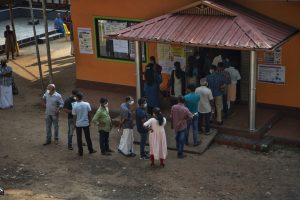The demand for a caste-wise census of the population raised by the opposition INDIA bloc recently has made a splash in Indian politics and seems to have boosted the morale of the Congress in some states. By all appearances, the initial impression is that it is a potent weapon capable of slowing down the Hindutva juggernaut by exposing its inner contradictions.
But interestingly, the idea of a caste census has received a cold reception in the southern state of Kerala.
Both the main political formations in Kerala, the Communist Party of India-Marxist (CPM)-led ruling Left Democratic Front and the opposition Congress-led United Democratic Front (UDF), have not shown much enthusiasm for the idea of a caste census.
Interestingly, even the Other Backward Classes (OBC) groups in Kerala haven’t been strident in their support for caste census. There is a fear among them that the findings of a caste census could favor Muslims in Kerala, who are included in the OBC list along with the Hindu OBCs.
In the 2019 general election, the Congress performed exceedingly well in Kerala, winning 19 of the 20 parliamentary seats from the state. The LDF, which controls the state assembly, won just one seat. With the INDIA bloc in firm control in Kerala – the BJP has been unable to win even a single Lok Sabha seat from the state – any move to divide society with a new idea, such as a caste census, could lead to political chaos and an unpredictable outcome.
For the Congress, even without the promise of a caste census, the party is expected to perform well in Kerala in the coming Lok Sabha polls too, despite the Pinarayi Vijayan-led LDF returning to power in the last assembly elections in 2021, breaking the pattern of the alternating of the LDF and UDF in the state. The Congress party’s optimism stems from the fact that it won spectacular victories against the LDF in assembly elections in two constituencies held recently in the state.
Meanwhile, the Sree Narayana Dharma Paripalan (SNDP) Yogam, an organization that represents Ezhavas, Kerala’s numerically largest Hindu backward caste, has welcomed the caste census after initial dithering. General Secretary Vellappally Natesan, who was among the first to oppose a caste census as a stunt, subsequently welcomed the census, although he has pointed out that it could hurt Hindu OBCs.
Drawing on data from Censuses 2001 and 2011, analysts have claimed that in Kerala, while the population growth rate among Hindus and Christians was 2.23 percent and 1.38 percent, respectively, the Muslim population grew at a rate of 12.23 percent in the period.
Such data available in the public domain has stoked apprehensions among OBCs. Natesan, for instance, has pointed out that the caste census will hurt the interests of Hindu backward castes, especially Ezhavas, and subvert the existing quota system in Kerala. “Once the survey is complete Muslims may ask for a hike in the reservation quota on the basis of the representation against population criterion,” he told The New Indian Express.
The BJP in Kerala will likely blow up the apprehensions of OBCs in light of the reported higher growth rate of the Muslim population. This could lead to polarization of the population in Kerala on Muslim versus non-Muslim lines.
The BJP may take a cue from this to craft its strategy in other states where the Muslim population growth rate is higher than that among Hindus and Christians.
Holding caste censuses could therefore have unpredictable consequences for the INDIA bloc.
Meanwhile, the Nair Service Society (NSS), an organization that represents the interests of Nairs, the numerically biggest forward caste in Kerala, has come down heavily on the proposed caste census move.
NSS General Secretary G. Sukumaran Nair criticized the caste census as divisive and anti-national. Upper-caste Syrian Christians haven’t responded on the issue yet, but they are likely to share the opinion of the NSS as their interests sync. Both Nairs and Syrian Christians are considered to be loyal vote banks of the Congress and provoking them won’t benefit the Congress.
Meanwhile, the Israel-Hamas war has already divided public opinion in Kerala. While Muslim groups in the state are strongly rooting for the Palestine people, the sympathies of the Sangh Parivar and certain Christian groups are with Israel. With the LDF planning to organize programs in support of the Palestinian people, the chances of narratives of war getting shriller and sparking divisions in Kerala are high.
Implementation of the caste census would polarize Kerala’s society, with Muslims on one side and others on the other. Against this backdrop, a caste census, which the Congress party is pressing for to boost its electoral chances nationwide, could backfire in Kerala, one of the few remaining strongholds of the grand old party. Unrest could spread to other states too where similar social equations exist.

































